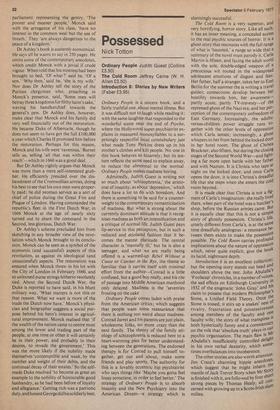Possessed
Nick Totton
Ordinary People Judith Guest (Collins £3.50) The Cold Room Jeffrey Caine (W. H. Allen £3.50) Introduction 6: Stories by New Writers (Faber £3.95) Ordinary People is a sincere book, and a fairly truthful one, about mental illness. But it was difficult not to laugh while reading it : with the same laughter that responded to the wonderful scene near the end of Psycho, where the Hollywood super-psychiatrist explains in measured monosyllables to a surprisingly respectful local constabulary just what made Tony Perkins dress up in his mother's clothes and kill people. No one in this book behaves so bizarrely ; but its texture reflects the same need to explain away, to reduce the abnormal to the normal Ordinary People makes madness boring.
Admittedly, Judith Guest is writing not so much about 'schizophrenia,' the aristocrat of insanity, as about 'depression,' which does have a lot to do with boredom. And there is something to be said for a counterweight to the contemporary romanticisation of madness. But what is strong about the currently dominant attitude is that it recognises madness as both an intensification and a critique of normal life. Judith Guest pays lip-service to this perception, but in such a reduced and etiolated fashion that it becomes the merest platitude. The central character is 'mentally ill,' but he is also a teenager, and what we are really being offered is a warmed-up Rebel Without a Cause or Catcher in the Rye, the theme so familiar that it carries itself with minimal effort from the author—Conrad is a little confused, but a good boy really, and his rite of passage into Middle American manhood only delayed. Madness is the 'seventies frosting on the cake Ordinary People comes laden with praise from the American critics; which suggests that people want some reassurance that there is nothing too weird about madness. Conrad Jarret and his parents are just plain, wholesome folks, no more crazy than the next family. The theory of the family etiology of schizophrenia is reduced here to a heart-warming plea for better understanding between the generations. The endorsed therapy is for Conrad to pull himself together, get out and about, make some friends and play sports. The authority for this is a lovably eccentric hip psychiatrist who says things like 'Maybe you gotta feel lousy sometime, in order to feel better.' The strategy of Ordinary People is to absorb insanity and the New Psychiatry into the American Dream—a strategy which is alarmingly successful.
The Cold Room is a very superior, and very horrifying, horror story. Like all such, it has an inner meaning, a concealed access to the real psychic sources of horror. It is a ghost story that resonates with the full range of what is 'haunted,' a range so wide that a summary of the novel must parody it. Carla Martin is fifteen, and facing the adult world with the sole, double-edged weapon of a precocious wit rooted in the widespread adolescent emotions of disgust and fear. Her father. half a stranger, takes her to East Berlin for the summer (he is writing a travel guide); connections develop between her hostility towards him, her awareness-partly acute, partly TV-travesty—of the repressed ghost of the Nazi era, and her perception of the contemporary unfreedom of East Germany. Increasingly, the adultsversus-children power struggle runs together with the other levels of oppression which Carla senses; increasingly, a ghost whispers to her from behind the locked door in her hotel room. The ghost of Christa Bruckner, also fifteen, but during the closing stages of the Second World War—and fighting a far more open battle with her father and with Nazism. It is Christa who taps at night on the locked door, and once Carla opens the door, it is into Christa's dreadful life that she steps when she enters the cold room beyond. It is made clear that Christa is not a figment of Carla's imagination : she really Ii"e there, when part of the hotel was a butcher's shop, before the Russian armies came. HO it is equally clear that this is not a siniPie story of ghostly possession. Christa's life, utterly different from Carla's, is at the vole time dreadfully analogous: a resonance between them exists to make the possession possible. The Cold Room carries profound
d implications about the nature of oppression which, never quite explicit, give the book its lucid, nightmare depth. . .
Introduction 6 is an excellent collection, but the opening story stands out head all, shoulders above the rest. John Abulafia's `Foolscap' chronicles, in a number of voices, the sad effects on Edinburgh University in 1932 of the enigmatic 'John Gray' and his claim to possess that modern Philosopher's Stone, a Unified Field Theory. Once the,. Stone is tossed, it stirs up a snakes' nest or rivalry, frustration and possessiveness among members of the faculty and one faculty wife; the story of what transpires is both hysterically funny and a commentarY on the role that 'absolute truth' plays in our psychic organisation. The main flaw is Mr Abulafia's insufficiently controlled delight in his own verbal dexterity, which sonic' times overbalances into incoherence. The other stories are also worth attention. Jim Crace's charming hippie anecdotes, which suggest that he might inherit the mantle of Jack Trevor Story when Mr StorYt is finished with it, are followed by four shor strong pieces by Thomas Healy, all con:cerned with growing up in a Scots-Irish slum milieu.


































 Previous page
Previous page